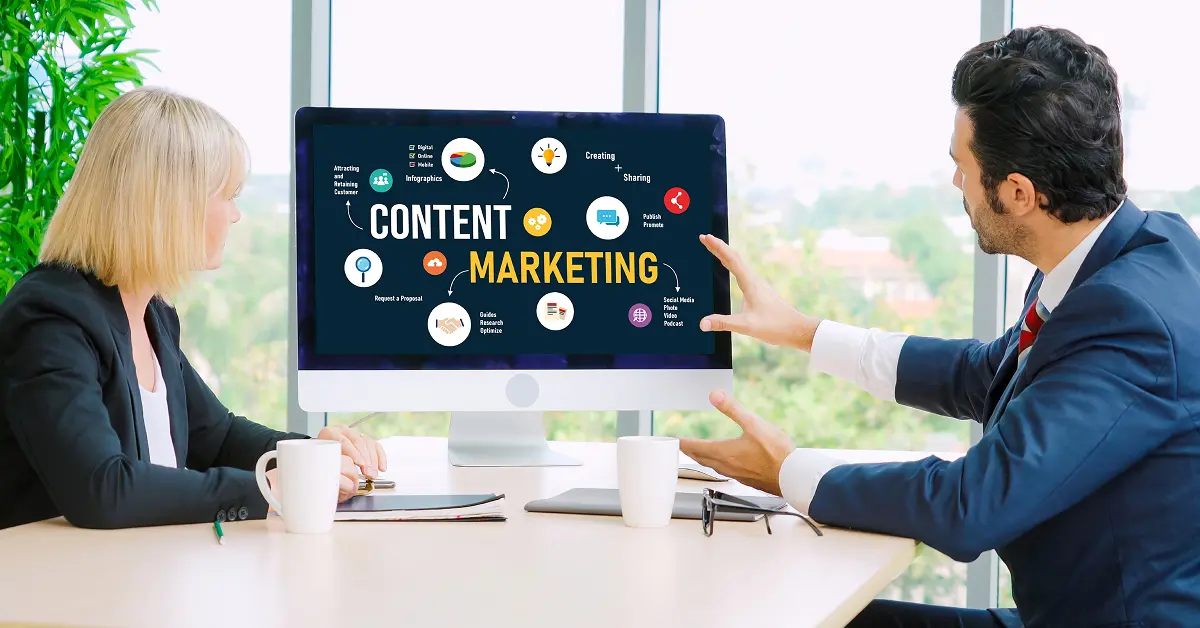Content marketing involves creating and distributing valuable, relevant, and consistent content to attract and retain a clearly defined audience. Unlike traditional marketing, content marketing focuses on providing useful information that addresses the needs and pain points of your target audience, rather than directly promoting your products or services.
The goal of content marketing is to build trust, create relationships, and establish your brand as an authority in your industry. Over time, this leads to better customer loyalty and increased sales.
How to Build an Effective Content Marketing Strategy for Your Website
To make the most of content marketing, you need to create a well-structured strategy. Here are the essential steps to build an effective content marketing plan:
Define Your Goals
Start by setting clear goals for your content marketing efforts. Are you looking to increase brand awareness, drive more traffic, generate leads, or boost sales? Your goals will guide your content creation and distribution efforts.
For example, if your goal is to drive more traffic, focus on creating SEO-optimized blog posts and articles that target keywords related to your industry. If you're aiming for lead generation, you might prioritize creating lead magnets like eBooks, white papers, or case studies.
Know Your Target Audience
Understanding your audience is key to creating content that resonates with them. Define your target audience based on factors such as demographics, interests, and pain points. Create buyer personas to help you visualize your ideal customers and ensure that your content speaks directly to their needs and desires.
Conduct Keyword Research
Keyword research is crucial for ensuring that your content is discoverable by search engines. Identify the keywords and phrases that your target audience is searching for, and incorporate these keywords naturally into your content. Tools like Google Keyword Planner, SEMrush, and Ahrefs can help you find high-value keywords that align with your content strategy.
Create High-Quality Content
The quality of your content matters more than anything else. Aim to provide content that is informative, engaging, and valuable to your audience. This can include blog posts, videos, infographics, podcasts, case studies, and more. Your content should offer solutions to your audience's problems or answer their questions.
Ensure that your content is well-researched, clear, and easy to digest. Use engaging visuals, such as images and videos, to break up text and make your content more appealing.
Optimize for SEO
To improve the visibility of your content, it's important to optimize it for search engines. This includes:
- On-page SEO: Ensure that your content includes relevant keywords, meta tags, alt text for images, and internal and external links.
- Technical SEO: Make sure that your website loads quickly, is mobile-friendly, and has a clean URL structure.
- Off-page SEO: Promote your content through social media, guest posts, and backlinks to increase its authority and improve rankings.
Promote Your Content
Once you’ve created valuable content, you need to promote it. Share your content across multiple platforms such as social media, email newsletters, and forums related to your industry. The more exposure your content gets, the more likely it is to drive traffic back to your website.
Consider using paid advertising, such as Facebook ads or Google Ads, to boost the reach of your content. Collaborating with influencers or other businesses in your industry can also help amplify your message.
Measure and Analyze Your Results
Content marketing is an ongoing process, and measuring your results is critical to understanding what’s working and what’s not. Use tools like Google Analytics to track metrics such as traffic, bounce rates, time on page, conversions, and engagement rates. By analyzing this data, you can adjust your strategy and improve your content over time.
Final Thoughts
Content marketing is not a one-time effort but an ongoing strategy that requires time, effort, and consistency. By focusing on providing value to your audience, optimizing for SEO, and continuously improving your content, you can drive more traffic to your website, build stronger relationships with your customers, and achieve your business goals.
Remember, the key to success in content marketing lies in understanding your audience, offering valuable content, and adapting to the evolving digital landscape. Start implementing these strategies today and watch your website’s performance soar!



